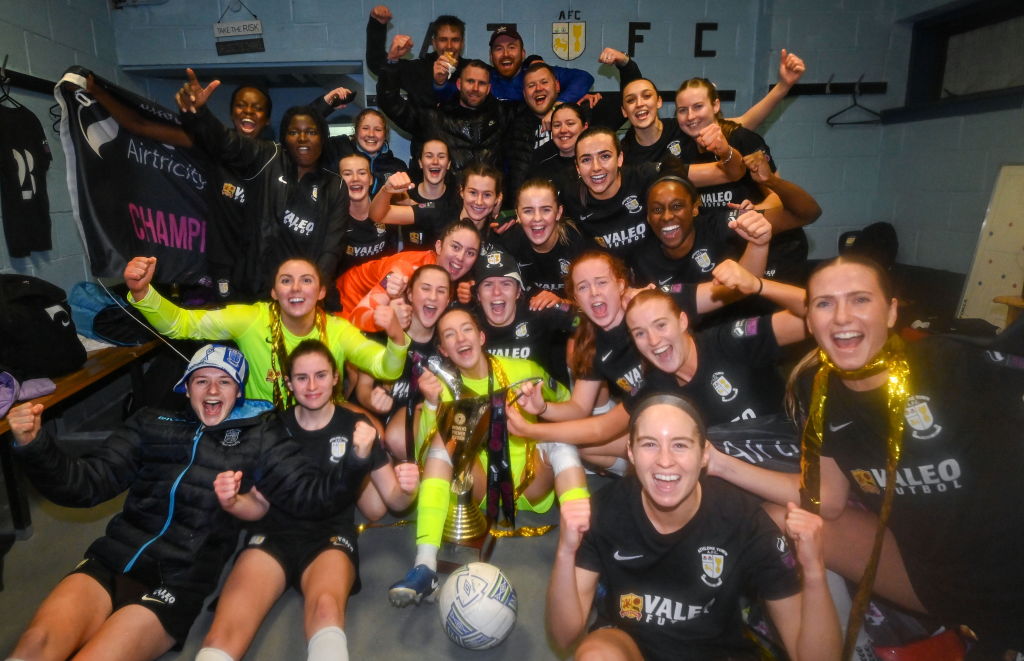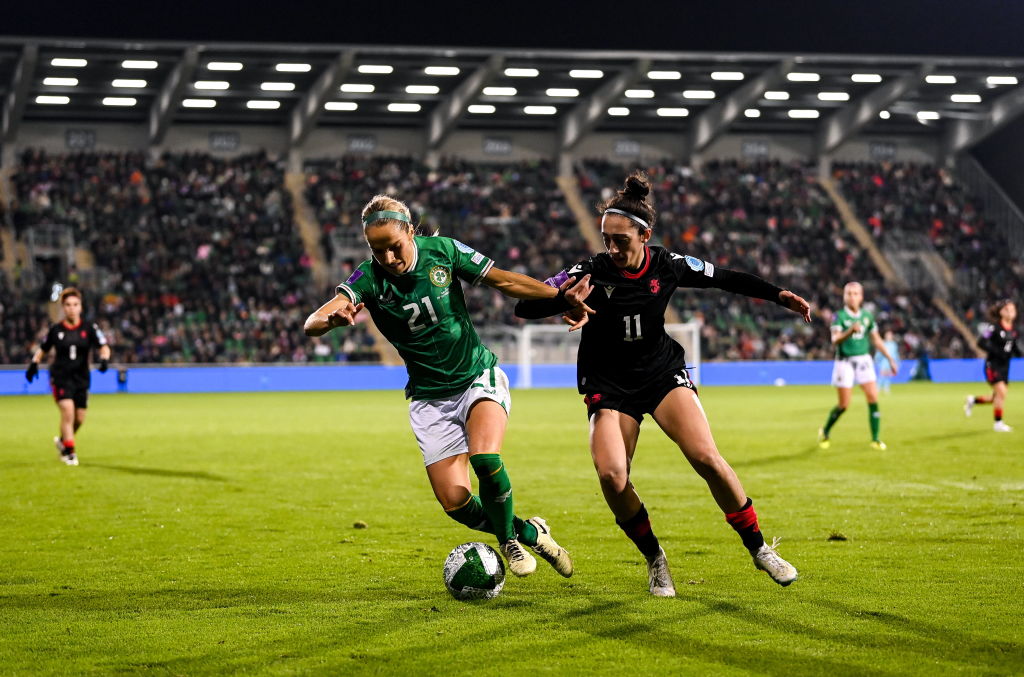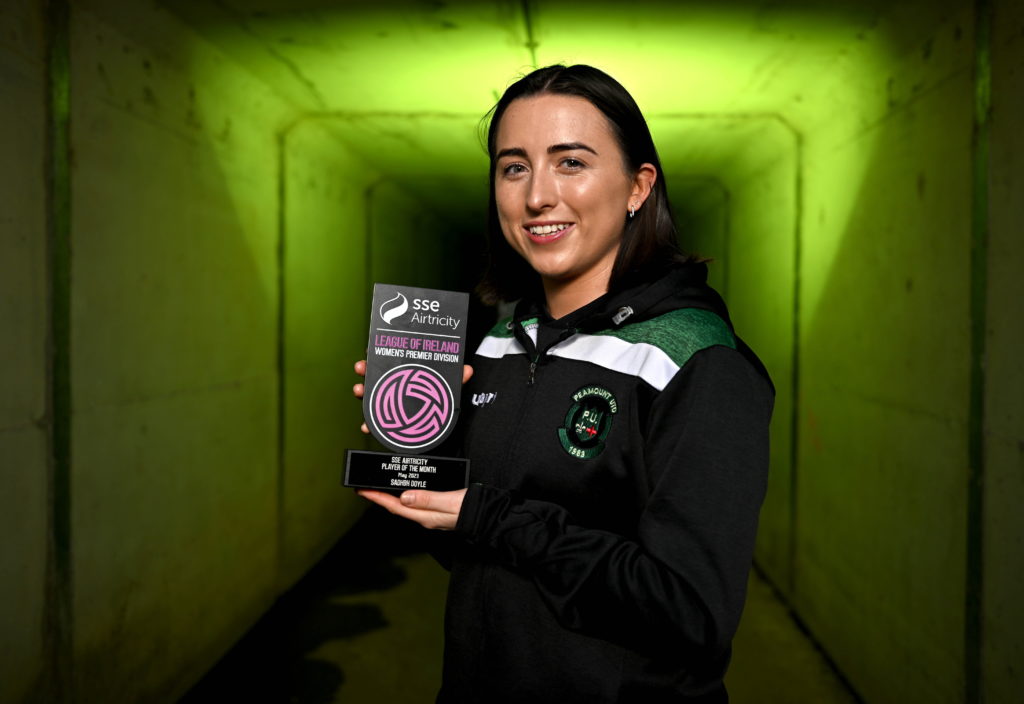It was only a few days before Ireland’s Euro qualifier playoffs when national team manager Eileen Gleeson faced scrutiny for not including enough domestic league players against Georgia.
This came after Athlone Town took home the Women’s Premier Division (WPD) title in October over Shelbourne.
Former Athlone head coach Ciaran Kilduff openly criticised Gleeson’s decision to exclude domestic footballers. Kilduff said that his players deserved a spot on Gleeson’s roster due to their high-level performance last season. Katie Keane was the only exception.
Gleeson quipped back and claimed that the Women’s Super League (WSL) and Ireland's top league have a “different intensity.” To Gleeson’s credit, more League of Ireland players have been added to her squad over the course of their Euro 2025 qualifying campaign.
 Athlone Town players celebrate in the dressing room. (Photo By Sam Barnes/Sportsfile via Getty Images) )
Athlone Town players celebrate in the dressing room. (Photo By Sam Barnes/Sportsfile via Getty Images) )For example, Galway United’s Julie-Ann Russell scored two goals in a 3-1 win against France in Cork last month. Prior to this, Russell scored Ireland’s sole goal in a 2-1 win against England in Norwich.
Given that Ireland was placed in the so-called “group of death,” Russell’s impact on the pitch shows that the abilities of players in the WPD are up to par.
The WPD has served as Ireland’s top league for women’s football since it was established in 2012. Despite this, very little has been invested in the competition as far as development past teenage years.
Peamount United, in particular, has given way to endless talent in recent years at both club and international levels, with four team members being called up to represent Ireland at senior level in the past year.
Ex-Peas player Tara O’Hanlon has since made the move across the water to Manchester City in the WSL—a tremendous achievement and a common career progression for Irish female footballers in the last decade. However, when it comes to fully professional competitions in Ireland’s backyard, there remain very few options and virtually none at home.
The Women’s Premier Division has become a “stepping stone” of sorts to well-funded and higher-profile leagues, but what is preventing it from being as financially supportive as other female football competitions in Europe?
Peamount player Karen Duggan is a former Irish international and pioneer in the WPD. She often writes about her experiences for The Irish Times.
Duggan spoke about what she has observed within the league to The Irish Post: “I don’t think there’s been a huge amount of progress,” she said.
“I think we have more girls playing and more talent coming through now than we did at the start, but at the start of the league, we were keeping players in the league for longer before they went professional because it wasn’t a defining factor that you had to be a professional to get into the Irish team. There wasn’t that sort of elitist professional mentality because the progress of women’s football has gone up massively in the last 10 years, even in England.
“So, it wasn’t the be-all and end-all to go professional back then, so we had more talented adults in the league. Whereas now, it’s kind of just a vehicle for young players coming through who want to make the next step. It’s very much a stepping stone league, so while we have more talent coming through, it’s kind of fleeting, I would say.”
 Julie-Ann Russell of Republic of Ireland (Photo By Stephen McCarthy/Sportsfile via Getty Images)
Julie-Ann Russell of Republic of Ireland (Photo By Stephen McCarthy/Sportsfile via Getty Images)Duggan stated that Colin Bell’s tenure as Irish national team manager was when this attitude of going professional shifted in the WPD.
“That’s all come down from the international team. That’s one of the reasons why I retired. Very much when Colin Bell came in, he was in charge of the U17s at the time; he was very much sending a message to those 17-year-olds that the way to progress is to go professional, and we were all at home-based training sessions together with the U17s. It was a constant message that for the team to go to the next step, you have to be professional.
“That’s true and that mentality is there now, and it’s helped our national team, but nothing has been done in a wholesale approach to make the league professional. We’re getting more girls to go professional, but there’s no one saying, ‘Okay, should we not be looking to make our league professional?’”
Many Premier Division teams have to rely on their men’s side for financial support and academy development structure. Peamount and DLR waves remain the outliers in this regard.
Duggan spoke more in-depth about this issue.
“From a governing body point of view, we’ve got affiliation with a men’s team that kind of allows us to potentially bridge that gap, but for a team like Peamount, it’s just going to get harder for us to compete, even though the league isn’t professional.
“I know Shamrock Rovers; they got a lot of stick when they came into the league because they set up a team and they put girls on contracts and were kind of the first step towards professionalism. But there are girls in other teams who are getting paid just as much and have probably more resources, but it’s all under the table, so that’s not helping anyone really, because everyone knows that, so no one is going to want to come to Peamount where they’re not getting money.”
At present, Irish internationals comprise the largest expatriate group in the WSL. They make up a majority of the national team. This also applies to “the granny rule”—foreign-born players who qualify to play for Ireland by way of having a relative. This could deter focus from players in the WPD.
Who was the stand-out player from @AthloneTownAFC this season? 🤔#WLOI pic.twitter.com/5BvAjRleI1
— LOI Women (@LoiWomen) October 31, 2024
“If they are not going to focus on making the league professional in the next five, ten years as part of their progression plan in the FAI, they can at least help the girls go professional. We’ve got a lot of girls that are going professional, and we can say, ‘Oh, it’s great the amount of girls that are going professional,’ but it’s the amount of girls going professional and making an impact and that feeding back into the national team that’s a huge thing.
“We had three centre-backs playing for Ireland the other day; none of them are Irish-born players, so we’re still reliant on the granny rule and other clubs developing a lot of our talent, and I think that needs to be looked at.”
Still, it is not the skill level players possess that is preventing the WPD from going professional. As previously mentioned, one player that has made a massive impact on Ireland’s Euro qualifier campaign is Julie-Ann Russell, someone who Duggan knows well on and off the pitch.
“I think Julie-Ann is an anomaly,” she said. “Firstly because she’s my best friend and I know the way she works, the way she operates. She’s a phenomenal athlete, very self-motivated. She doesn’t need the tools of a professional setup to act like a professional athlete.
“So, the league can produce players like that, but a lot of it comes from the individual because unless you’re getting that contact on the pitch, you can’t compare what we’re doing to professional teams. So, we can produce the talent, but we can only get it to a certain point at the moment.
Duggan also agrees with Gleeson's sentiments about leagues and intensity, but added that the FAI has way more to do when it comes to bridging the gap between leagues.
“So, Eileen is right in a way that what we’re doing isn’t comparable to a professional setup. I don’t think it should be a complete blocker because you’ll have anomalies and people who are self-driven and self-motivated and can replicate that professional setup themselves. So, there’s talent there; that talent needs help. I think that help could be bridged more by the FAI. I think that the fact that the U23 team that they’ve been talking about isn’t materialising anytime soon is ridiculous.”
She added, “I can’t see anything tangible being done by the FAI with regards to improving our league or facilitating an environment where the talent in our league can reach those professional standards in any way. If they don’t want to make the league professional, that’s fine; that’s not on them. They might want to leave it up to the clubs, but surely they want to bridge the gap between where we are and where the professional leagues are because we’re seeing too many girls going professional now and not making it.
“I think there needs to be a bridging gap there. I think that comes in the form of the FAI putting on more sessions so that there’s more contact time for the best girls in the league, and then I think you’ll see more girls coming from our league because they’re not relying on a Peamount, which is run generally by volunteers, to add more nights training when they simply can’t afford it.”
 Sadhbh Doyle of Peamount United (Photo by Sam Barnes/Sportsfile)
Sadhbh Doyle of Peamount United (Photo by Sam Barnes/Sportsfile)
